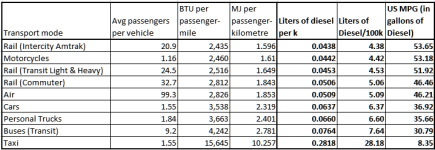Domush & creeley. You and your type seem impervious to the common sense from those like toppop52,crazyal and RoyJackson. Did you guys grow up watch Star Trek or something? High ideals are great but some can not be achieved.
What do you get when you aim low.. lower than your aim. You aim high and accept good or, at least, decent. That is what ideals bring you. When you expect little, you get what you expect.
Until you can find a way to cheat the laws of physics. There are no efficiency breakthroughs just around the corner. Ever done any engineering in physics, chemistry and fluid dynamics? The low hanging fruit was picked long ago.
It is basic math based on physics.
Electrical energy is created by
burning fossil fuels in a power plant at 40% efficiency, followed by transmitting it to your house
at 93% efficiency, and using it in an electric vehicle
at 92% efficiency, providing a total efficiency of around 34% for an electric vehicle.
Crude oil refineries operate
at 75% efficiency, and gasoline distribution might cause
another 6% energy loss. Since internal combustion engines are only 20% efficient, total efficiency would be around 14%.
Assuming that the natural gas and oil to power our vehicles comes from the same well, we can directly compare these efficiencies, and thus conclude that electric vehicles are significantly more efficient (34% vs 14%). That is only the automotive equivalent. Subways are already electric for this reason. This, of course, is from today where electric vehicle research is at a bare minimum. Ramp that up and the numbers will only get better for electric.
There is also the added benefit of electric going further with less weight, so people will naturally be compelled to reduce the size of their cars/trucks instead of simply throwing in more gas, like they do today. As with electric, more weight == more batteries required, and that costs money. There are intrinsic benefits to moving to electric which need not be legislated.
Mass transit only works where many people are crammed into a small footprint such as New York, London England, Tokyo etc. The US and Canada is mostly wide open spaces with a very low population density unlike France, Germany, England etc.
Over half of the US population is located within 50 miles of the ocean. Pollution centers such as Los Angeles, Chicago, etc can be equipped with more robust mass transit, cutting down on a very large amount of auto emissions. The entire US need not be a perfect grid of mass transit, but there certainly could be a few transcontinental high speed railways to cut down on auto and air travel as well as a bulking up of near-ocean transit for the majority of the population.
Maybe others should be watching a little less television altogether and reading more. It's time to step back to assess the situation from an objective standpoint instead of an emotionally invested one. Gas engines are outdated. It's time to move on as much as possible, and sitting still doesn't fix our looming oil crisis. China is not getting any smaller and oil has never been plentiful enough for us.
Insanity is doing the same thing and expecting a different result. It's time to stop spinning our wheels, in multiple senses.
Is this the way to go? I don't know, but at least have the conversation. It should be quite obvious we are not on a sustainable course.

